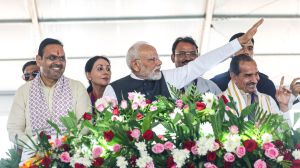India’s trade, infra policies from last few years have begun to bear fruits, says Chief Economic Advisor at IIMA conference
The three-day mega event was jointly organised by the 10 research centres of IIMA with “Confluence of Growth, Sustainability, and Resilience” as the theme.
 Dr V Anantha Nageswaran at the IIMA event. (Express)
Dr V Anantha Nageswaran at the IIMA event. (Express)More than 1,200 abstract submissions from 21 countries; nearly 450 research paper presentations; and more than 800 attendees, including research scholars, academicians, and industry practitioners, from over 600 institutions and organisations from India and abroad: the first edition of the India Management Research Conference or IMRC 2024 at the Indian Institute Of Management–Ahmedabad ended on a high note on Monday.
The three-day mega event was jointly organised by the 10 research centres of IIMA with “Confluence of Growth, Sustainability, and Resilience” as the theme. The discussions and sessions centred around the future of India-centric management research.
In his keynote address on Sunday, Chief Economic Advisor Dr V Anantha Nageswaran shared his insights on India’s economic trajectory, challenges that the country faces and possible solutions.
“The political and geoeconomic environment is evolving, and going forward, we are not counting on external or export demand as an important driver of growth. We also need a more holistic and smarter way of thinking about climate change and energy transition, the socio-economic challenges of Artificial Intelligence, Chinese dominance in manufacturing, and so on. That is why all sections of the economy, public sector, private sector, and academia have to come together in order to create a domestically strong and resilient economy in terms of policies, education, and skill availability tailored to India’s needs,” he stressed.
India’s trade, socio-economic, and infrastructural policies from the last few years have begun to bear fruits, he asserted. “Our rank in the World Bank’s Logistics Performance Index (LPI) has also improved from 44th in 2018 to 38th in 2023. We continue to strive for better but it’s important to put things in perspective as well. We have to understand that we live in a world of much greater uncertainties, and we need to think of much smarter ways to deal with arising challenges,” Dr Nageswaran added.
The second day of IMRC 2024 on Sunday brought together directors of seven leading management institutes for an insightful panel discussion on the “Future of Management Education”. Professor Bharat Bhasker of IIM Ahmedabad; Prof Debashis Chatterjee from IIM Kozhikode; Prof Arvind Sahay of MDI Gurgaon; Prof Bhimaraya Metri from IIM Nagpur; Professor Ashok Banerjee from IIM Udaipur; Professor Rishikesha T Krishnan from IIM Bangalore; Prof Pawan Kumar Singh of IIM Tiruchirappalli; along with the session moderator Prof Neharika Vohra, IIM Ahmedabad, deliberated upon the challenges and opportunities in management education.
“The challenge against the world as well as India is advanced robotics, AI, and automated and flexible manufacturing, and to address them and drive this economy, we need more skilled and educated people who are well-trained with new methods and techniques to address our problems and provide practitioners more effective solutions to the management problems that they encounter. To support the emerging community of management scholars in India, we aim to establish IMRC as a platform through which Indian researchers can come together and address the current as well as the future problems of this country.” Prof Bhasker, Director, IIMA, said.
Among other significant speakers at the event on the second day was Prof Noshir Contractor, Jane and William J White Professor of Behavioural Sciences at Northwestern University, Illinois. In his address, he talked about ‘Tackling Societal Grand Challenges: Present and Future, including Accelerating Innovation, Scaling up Global Health Solutions, Missions to Mars, and Human AI at Work’. He elaborated on various technical studies and innovative projects they have done that address these challenges.
“From the time of the Satellite Instructional Television Experiment (SITE) to today’s era of Generative AI, we have to learn some lessons. If we think of AI as a substitute, it’s not really going to help us. If we think of AI as a means to do more, it is also not going to entirely help us very much because it will increase the gap between the haves and have-nots in society. We have to reconfigure the ways in which we use AI.”







